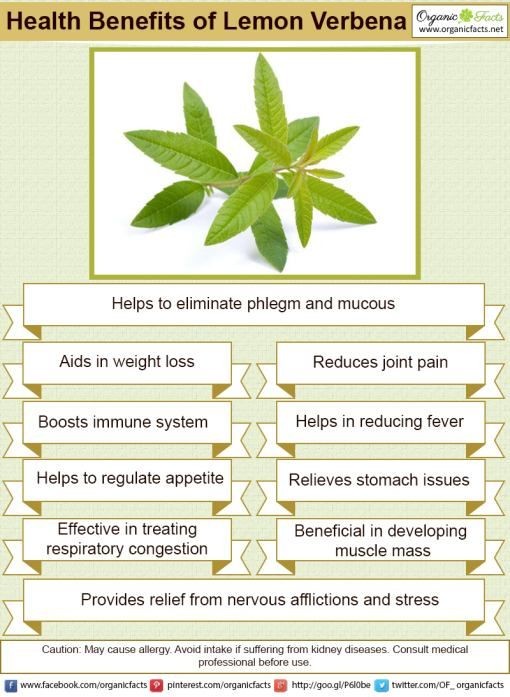
Contents
8 Health Benefits of Lemon Verbena
Lemon verbena (Aloysia citrodora), also known as lemon beebrush and lippia citriodora, is a perennial shrub in the plant family Verbenaceae. It resembles common grass, but has a strong fragrance.
This plant is native to South America and grows in Peru and Chile. It thrives in warm, sunny regions and can grow up to nine feet tall with white blossoms.
When the leaves of the lemon verbena plant are crushed, they release a strong citrus aroma. This makes it a popular addition to herb gardens. The leaves are tall and pointed with a rough texture.
What compounds make up lemon verbena?
Leaves of lemon verbena contain volatile oil, mainly composed of two compounds—geranial and neral. These compounds give the plant its lemon scent and have calming and mood-enhancing effects on the central nervous system.
Other compounds found in the plant include:
- Citral
- Cineole
- Limonene
- Mucilage
- Tannins
- Flavonoids
8 health benefits of lemon verbena
Lemon verbena has excellent nutritional values with various health advantages. It contains terpenoids, volatile oils, flavonoids, and phenolic acids.
The health benefits of lemon verbena include:
- Reduces inflammation: Lemon verbena possesses anti-inflammatory and antioxidant qualities that help reduce inflammation and oxidative stress. It also protects cells from oxidative stress and decreases exercise-induced muscle damage.
- Aids in detoxification and boosts immunity: Lemon verbena is rich in phenolic compounds that defend against free radicals, reducing oxidative stress and strengthening the immune system.
- Improves joint function: Lemon verbena has been linked to better joint function in a study with individuals suffering from joint difficulties.
- Aids with weight loss: Combining lemon verbena and hibiscus has been shown to help with weight reduction and decrease appetite and food consumption.
- Helps with insomnia: Lemon verbena contains oils that stimulate the gamma-aminobutyric acid (GABA) system in the brain, assisting with insomnia and promoting relaxation.
- Improves anxiety and stress levels: Lemon verbena has a direct influence on hormone levels, reducing anxiety and improving sleep quality.
- Fights staph infections: A lemon verbena extract inhibits the development of Staphylococcus aureus and may be effective in treating the infection.
- Aids in digestion: Lemon verbena tea soothes the stomach, relieves indigestion, and alleviates symptoms of irritable bowel syndrome.
QUESTION
How is lemon verbena used?
Lemon verbena was introduced to Europe in 1784 and has been used in the fragrance industry. Aside from infusions, lemon verbena leaves can be used to flavor food and beverages.
Various uses of lemon verbena include:
- Lemon verbena is used as an air freshener due to its invigorating and relaxing characteristics.
- Its essential oil can be diffused or applied to the skin after diluting with a carrier oil.
- Tea can be made from the lemon verbena plant.
- The plant can be used in sweets, soups, jams, and drinks.
- Pregnant and nursing women should avoid lemon verbena due to the risk of birth abnormalities.
- If you are taking any herbal supplement or prescription medicine, consult a doctor before consuming lemon verbena.
- Lemon verbena offers various potential health benefits, but more research is needed to fully understand its effects on human health.
Culinary use
Verbena leaves can be used in culinary applications. Young leaves can be used in stir fry or salad, while dried leaves can be used to season dishes and reduce fatty flavors.
They also pair well with sweets and cold beverages.
How to make lemon verbena tea
Make lemon verbena tea by:
- Infusing dried or fresh leaves in hot water.
- Allowing it to steep for up to 15 minutes.
- Adding honey to sweeten if desired.
Are there any downsides of lemon verbena extracts?
Consider the following precautions when using verbena leaves:
- Topical use may cause mild dermatitis, so sensitive skin should consult a dermatologist before use.
- People with renal illness should avoid verbena leaves as they may worsen the condition.


